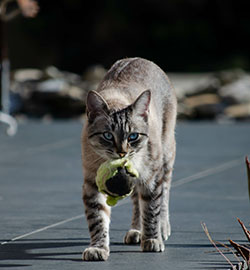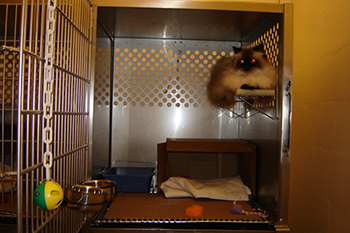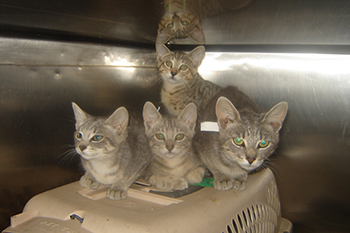Feline Welfare
Fetching Behavior in Cats and Dogs

Fetching is observed in both cats and dogs, but the prevalence and possible functions of this behavior have not been studied in detail. In collaboration with Dr. James Serpell and the University of Pennsylvania, we analyzed data from a large sample of both cat and dog owners to better understand the cats and dogs who demonstrate this behavior. This behavior has its roots in hunting behavior in both species, but is likely influenced by their social interactions with humans.
Project Leaders: Mikel Delgado (PI), Judi Stella (PI), Candace Croney
Optimizing Caged Cat Welfare

This project aimed to assess the impact of aspects of the macro- (room) and micro- (cage) environment on cat behavior and welfare.
Results indicate the quality of the macro-environment is at least as important to the cat and her/his welfare as is the quality or size of the cage.
Project Leaders: Candace Croney (PI), Judi Stella
Funding Source: Morris Animal Foundation
- Environmental factors that affect the behavior and welfare of domestic cats housed in cages
- Behavior and Welfare of Domestic Cats Housed in Cages Larger than U.S. Norm
- Enhancing the Welfare of Caged Cats Through Environmental Management: The Housing Room
- Enhancing the Welfare of Caged Cats Through Environmental Management: The importance of routine and cage environment
Coping Styles in Cats

Identifying and understanding the effects of individual differences in coping style could lead to improvements in cat welfare. The aim of this study was to identify coping strategies in domestic cats housed in a ‘mock’ shelter environment.
Three clusters were identified that differed in the pattern of expression of hiding and perching behavior, food intake, and eliminations. Identifying cats that have difficulty coping in challenging environments could lead to better welfare outcomes.
Project Leaders: Candace Croney (PI), Judi Stella
Funding Source: Morris Animal Foundation
Sickness Behaviors and Other Welfare Indicators in Cats

The objective of this project was 1) to compare the response of healthy cats and cats with feline idiopathic cystitis (FIC) to unusual external events (UEE); 2) and to evaluate the behavioral and physiological responses of these cats to a 5 day psychological stressor.
Comparable sickness behaviors were found in both groups in response to UEE and the short term stressors indicating this is a useful, non-invasive metric of cat welfare.

